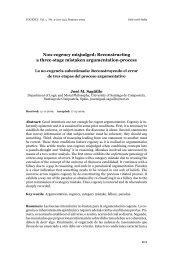Cogency v2 n2
Cogency v2 n2
Cogency v2 n2
Create successful ePaper yourself
Turn your PDF publications into a flip-book with our unique Google optimized e-Paper software.
COGENCY Vol. 2, N0. 2, Spring 2010<br />
published in 1950, one year before Wittgenstein’s death. There are a few<br />
quotes from Wittgenstein in this text in some of its more important parts.<br />
The ideas that Toulmin discusses in these parts are written in a fashion that<br />
would be familiar to those with experience of Wittgenstein’s writings. Interestingly,<br />
Toulmin even anticipates some discussions that appear in Wittgenstein’s<br />
posthumously published writings. For example, when Toulmin challenges<br />
the correspondence theory of truth applied to ethical problems and reflects<br />
on “reasoning and its uses”, his formulations resemble very much those of<br />
Wittgenstein’s Philosophical Investigations:<br />
In the case of descriptive sentences, the problem why one particular criterion<br />
of truth is appropriate was solved when we examined the purposes<br />
for which description are used. The same intimate connection, between<br />
the logic of a mode of reasoning and the activities in which the<br />
reasoning plays its primary part, can be strikingly illustrated with the<br />
help of an especially simple (though artificial) example –that of an activity<br />
in which the reasoning operates as near as may be functionlessly<br />
(Toulmin, 1950: 81).<br />
Another example foreshadows remarks of Wittgenstein in On Certainty.<br />
Here Toulmin justifies the ‘elimination’ of the bad habit of putting forward<br />
“limiting questions” in much the same way and for the same reasons that<br />
Wittgenstein warns us about the nonsense of questioning hinge propositions–simply<br />
because there are some questions that can not play any role in<br />
the structure of reasoning:<br />
In the everyday sense, the question, ‘What holds the earth up?, is a ‘limiting<br />
question’, having all the peculiarities I have referred to:<br />
(i) If someone does ask it, it is not at all clear what he wants to know, in<br />
the way it is if he asks, ‘What holds your peach-tree up? In ordinary cases,<br />
the form of the question and the nature of the situation between them<br />
determine the meaning of the question: here they cannot do so, and one<br />
can only guess at what is prompting it... (Toulmin, 1950: 206-207).<br />
In this short editorial text, I have been limited myself to a triumvirate of<br />
the Tractatus, Philosophical Investigations and On Certainty. But it would<br />
12








